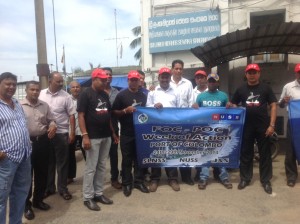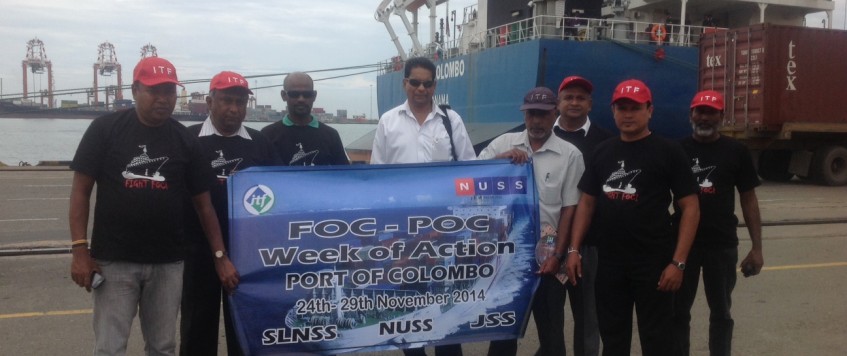-
24
Nov
Flag of Convenience (FOC) Campaign


The ITF is unique amongst international trade union organisations in having a powerful influence on wages and conditions of one particular group of workers, seafarers working on ships flying Flags of Convenience (FOCs). FOCs provide a means of avoiding labour regulation in the country of ownership, and become a vehicle for paying low wages and forcing long hours of work and unsafe working conditions. Since FOC ships have no real nationality, they are beyond the reach of any single national seafarers’ trade union.
The ITF has therefore been obliged to take on internationally the role traditionally exercised by national trade unions – to organise and negotiate on behalf of FOC crews. For 50 years the ITF, through its affiliated seafarers’ and dockers’ unions, has been waging a vigorous campaign against shipowners who abandon the flag of their own country in search of the cheapest possible crews and the lowest possible training and safety standards for their ships.
In defining an FOC the ITF takes as its most important criterion whether the nationality of the shipowner is the same as the nationality of the flag. In 1974 the ITF defined an FOC as:
Where beneficial ownership and control of a vessel is found to lie elsewhere than in the country of the flag the vessel is flying, the vessel is considered as sailing under a flag of convenience. The ITF campaign against flags of convenience, which was formally launched at the 1948 World Congress in Oslo in Norway, has two elements:
- A political campaign designed to establish by international governmental agreement a genuine link between the flag a ship flies and the nationality or residence of its owners, managers and seafarers, and so eliminate the flag of convenience system entirely;
- An industrial campaign designed to ensure that seafarers who serve on flag of convenience ships, whatever their nationality, are protected from exploitation by shipowners.
Over the past 50 years the ITF’s maritime affiliates have developed a set of policies which seek to establish minimum acceptable standards applicable to seafarers serving on FOC vessels. The policies form the basis of an ITF Standard Collective Agreement which sets the wages and working conditions for all crew on Flag of Convenience vessels irrespective of nationality. It is the only agreement normally available to shipowners who run into industrial action. All FOC vessels covered by an ITF-acceptable agreement are issued an ITF Blue Certificate by the ITF Secretariat, which signifies the ITF’s acceptance of the wages and working conditions on board. About a quarter of all FOC vessels are currently covered by ITF agreements, thus giving direct protection to over 123,000 seafarers.
Compliance with ITF-recognised agreements is monitored by a network of over 130 ITF inspectors in ports throughout the world. ITF Inspectors are union officials who are either full time or part time working directly with the ITF. By inspecting FOC ships they monitor the payment of wages and other social and employment conditions and if necessary take action to enforce ITF policy. In recent years the number of inspectors has doubled and they are now to be found in ports in every region of the world.
Since its inception, annually, the NUSS has been conducting an FOC Action Week in the port of Colombo along with dockers and most of the other fellow port-based trade unions too have joined this activity. In addition, the NUSS has conducted demonstrations and trade union education events etc. on the topic of FOC.
Under this FOC Campaign, the ITF has put in place a Network of ITF Inspectors at ports around the world and their main task is to carry out ship inspections. For more detailed information about the ITF Inspector at Colombo harbour, Ranjan Perera please go to the “ITF Inspectorate” section on this website.



